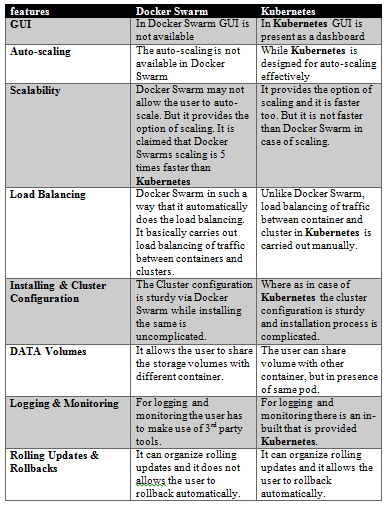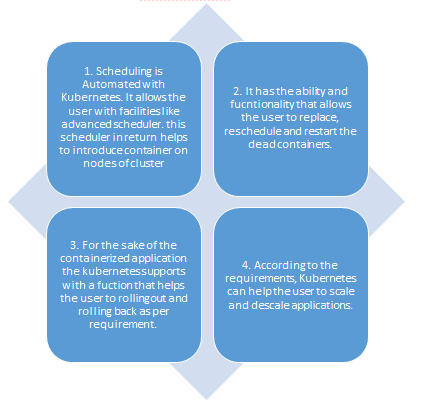Top Kubernetes Interview Questions
In the technical language and terms, one can define Kubernetes as an open-source orchestration platform. By making use of Kubernetes, multiple large amounts of containers can be managed easily. Further, as we said is an open-source platform, which declares that Kubernetes can be accessed by everyone. There is no need for authentication required like in the case of a closed source platform. However, when it comes to open-source platforms, people tend to back off. And such backing off has a reason.
Most of the open-source platforms are not updated constantly. This is because the users of open source tend to be less and they use these platforms infrequently. Now in the case of open-source platforms like Kubernetes, Java, etc., there is a regular stream of updates. The library, classes, or functions of these types of open source platforms are updated frequently. And the reason for such regular updates is that open sources like these are pilgrimage for the developers and programmers. These professionals work on these platforms and spend most of their time creating new codes and programs here.
Now let us come back to Kubernetes. So Kubernetes being an open-source orchestration platform, it allows its users to scale, manage, automate, and deploy computer application. It was created by Google and presently is being sustained by the Cloud Native Computing Foundation. Kubernetes focuses on managing, scaling, and operating containers of applications. There many huge and reputable companies like Yahoo Japan, Ing, Pokemon, Sound Cloud, Huwaei, Box, eBay, The New York Times,s, etc., use it as their orchestration tool. Such global acceptance and usability of Kubernetes have led to a significant increase in the demands of professionals who could work with it efficiently. So in order to become the maestro of Kubernetes let us discuss some of the top-notch interview questions of Kubernetes to increase your chance to excel as a developer.
The questions in this article are categorized on the basis of
- Kubernetes Foundational Questions
- Kubernetes Architectural Questions
- Kubernetes Questions based on different Scenarios
We have categorized all the questions for the betterment of your understanding. Further in this article, we will discuss in detail important definitions, differences, and theories. Such a discussion will help you understand each and every topic systematically. And hence it will be easier for you to learn everything with ease.
Foundational Kubernetes Interview Questions
All the questions are designed and well patterned to stimulate your conceptual understanding of all the terms of Kubernetes.
Q1. Differentiate between Kubernetes and Docker Swarm.
There are certain features and the basis of those features we will differentiate between Kubernetes and Docker Swarm:

Q2. Explain Kubernetes.
The Kubernetes is was designed and developed by Google. And it can be defined as an open-source orchestration tool. In other words, Kubernetes is an open-source container manager. It helps the user to organize, scale, and automate many large containers. As it is developed by Google it doesn’t have to prove its excellence. In layman's terms, we can call the Kubernetes a solution for the management of multiple containers.
Q3. Define the relation between Kubernetes and Docker.
Docker delivers facility to manage the lifecycle of a container, while it also helps in building the run-time container. Well, Docker may help in building run-time containers and so on but the Docker container cannot communicate. These containers need a platform to communicate. This is where the Kubernetes plays a crucial role in arranging communication between the Docker containers.
Q4. Describe Container Orchestration.
There are certain micro-services provided to every application. And those micro-services can serve only when they are synchronized well. The synchronization of the micro-services is highly important, in order to run any application in a seamless manner. In such cases the container orchestration comes in to play, in layman terms orchestration is known as the fusion of different types of instruments to produce a great piece of music. Likewise the role of the container orchestration to fuse different components of an application to deliver a smooth service.
Q5. What is the necessity of Container Orchestration?
A number of micro-services are installed in the container of an application. Without the micro-services, the application can’t perform specific functions. And the containers that contain the micro-services can only work when they will communicate with each other. Here the inter container communication is necessary to perform certain activities in the application. In such conditions, the container orchestration tool comes into play. The container orchestration basically synchronizes all the containers containing micro-services.
Q6. Describe the features of Kubernetes.

Q7. Explain the process of simplification of containerized deployment with Kubernetes.
Every application contains a group of containers that tend to run across a number of hosts. Well in order to perform well, these containers need to communicate with each other. And the communication of these containers is possible by means of Kubernetes. Kubernetes is basically cloud-agnostic and is designed in a certain way to allow communication between multiple containers. And this is how the deployment of containers takes place.
Q8. Define the clusters in Kubernetes.
Basically, the Kubernetes is designed in such a manner that it allows the developers to feed cluster services and each service is designed according to a certain configuration. After feeding the cluster services with the desired codes and commands, then the cluster will automatically run configuration in the infrastructure.
Q9. Define the Google Container Engine?
The Google Container Engine can be defined as the Open-source manager for Docker and the related clusters. The GKE or Google Container Engine is basically an engine that supports clusters that run in the public cloud services of Google.
Q10. Define Heapster.
Kubelet provides data and these data run on each node. But these data need are needed to be aggregators. This is where the Heapster comes into play and aggregates all data that are supplied by the Kubelet. Now this container is generally supported by the cluster of Kubernetes and it runs like a pod. Then it finds all other clusters and examines the information used from the nodes of Kubernetes. This is done with the help of a non-machine agent.
Q11. What do you by minikube?
The minkube can be defined as the tool that helps to run Kubernetes in a localized manner or locally. This in return leads to running Kubernetes in a virtual machine.
Q12. Define Kubectl?
The kubectl can be defined as a platform that can be used to pass the commands to the cluster. In other words, it delivers commands to the CLI to run against the Kubernetes clusters.
Architectural Kubernetes Interview Questions
These are the questions that are based on the architectural point of view.
Q1. Define the various components of Kubernetes Architecture?
Basically, there are 2 components of Kubernetes and those are master nodes and worker nodes. Further, these nodes have different components to support Kubernetes.
Components of Master Nodes
- Kube-controller
- Kube-manager
- Kube-API server
- Kube-scheduler
Components of Worker Nodes
- Kubelet
- Kube-proxy
Q2. Explain Kube-proxy?
The Kube-proxy is a component of worker nodes. The Kube-proxy goes through each node and runs in them. It helps in TCP/UDP packet forwarding transversely back end network services. And eventually, the proxy of the network or network proxy is configured in the Kubernetes API in every single node. And finally, the cluster IPs and ports are supplied by the compatible environment variables of docker. And these clusters are opened by the proxy.
Q3. Describe how does the master node work in Kubernetes?
The Kubernetes master node is basically designed to control the nodes and each node contains a number of containers. And these containers are stored and secured and pods. And further, those pods have the capacity to store multiple containers at a time. All the containers are stored in the pods in accordance to the requirements and certain configurations. Further, when the pods are used they could be organized and deployed with the help of a command-line interface or user interface. The scheduling process of the pods is carried out. The pods scheduled on the nodes according to the requirement of the resource. Ultimately the communication is established between the Kubernetes nodes and master components.
Q4.What do the kube-apiserver and the kube-scheduler do?
Role of Kube-apiserver
Kube-apiserver can be defined as the front-end of the control panel of the master node. It goes along the scale-out architecture. It helps to expose all the components of Kubernetes Master Nodes. And it plays a significant role in founding communication between master node components and nodes of Kubernetes
Role of Kube-scheduler
The Kube-scheduler performs the distribution of workload. It also helps in the management of workload. It performs all such activities in the worker's node. It can choose an appropriate node. And in that node, the unscheduled pods run. The pods run according to the requirement of the resources. And when the pods run, it keeps the record of the utilization of resources.
Q5.Briefly Explain Kubernetes Controller Manager.

No comments:
Post a Comment